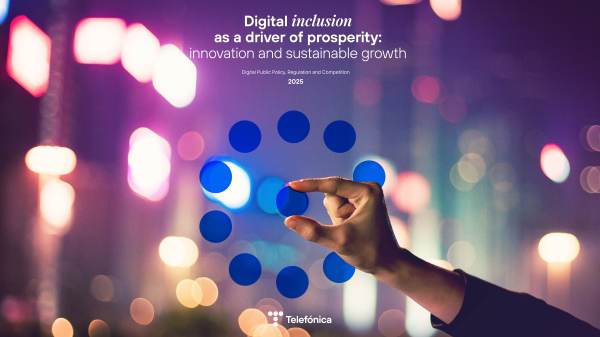
We are living in an age of unparalleled global digital growth and nobody should be left behind in the opportunities that this offers. However there is evidence pointing to the fact that Europe is at risk of losing pace with other regions of the world, like the United States and certain parts of Asia, in terms of the investment made and commitment shown to the sector by state and industry. If Europe wants to encourage the development of the new digital generations, it needs to move from rhetoric to action to address this imbalance before it becomes too late.
Europe is currently experiencing severe levels of unemployment; in Spain for instance, unemployment runs at 21 pc – that is over a fifth of the population – yet technology companies face a critical shortfall of talented ICT experts. This contradictory picture reveals a mismatch between the skills on offer and those in demand in today’s fast moving technology market. At Telefónica, we firmly believe education holds the key to bridging this skills-job gap. In fact, education should be viewed as the seed of innovation, and therefore the future of growth. It’s clear to us, not just in Europe but globally, that we need to move towards the ‘knowledge economy’. We can do this by incorporating digital into all stages of learning throughout life in order to adapt competencies, boost employability, and increase the competitiveness of the countries.
Every day at Telefónica we witness the amazing talent that can be found in young people. There is a huge opportunity for companies to drive innovation if they invest in young people. We’re convinced that the talented younger generation of digital natives will help drive our company in the future, so we can be as innovative and competitive as possible in a dynamic sector. This is not just rhetoric; in 2014 we recruited a total of over 9,000 young people (under the age of 30) throughout the Telefónica Group – 3.5 pc more than the previous year.
The European Commission was right then to create the Grand Coalition for Digital Jobs initiative, of which we are one of the founding partners, which was launched at the World Economic Forum in 2013. Its aim is to bring everyone together and enable collaboration in order to achieve the right level of digital skills and employability. It is vital we match the right people with the right jobs and enable EU skilled ICT workers to fully benefit from the opportunities that the digital world brings us.
As part of the Grand Coalition for Digital Jobs, Telefónica hosted the first European Digital Job Fair in Madrid this November. The event brought together in Madrid, both in person and online, 59 companies from eleven European nations, offering more than 800 qualified jobs.
However, the Fair was about more than just bringing people together to discuss policy. We wanted to take it further and truly support young people in every step of the digital worker lifecycle. We found, when distilled, the actual steps that are needed to bridge the digital skills gap and enable young job seekers to have a real shot at the best opportunities came down to the following key points:
- First, we must foster the digital mind-set and raise awareness around the potential of digital.
- Based on a simple idea – focussing on young people and technology as the future of Europe – Talentum – one of our social initiatives under the Telefónica Open Future_[i] programme provides access to job and digital learning opportunities for thousands of young people and university graduates which demonstrates the possibilities of digital. So far, more than 700 digital jobs have been secured thanks to this programme. In addition to this, over 150,000 young people across Europe have been helped to date by the Think Big initiative, another social innovation initiative under the OpenFuture umbrella.
- Once a digital mind-set has been established, the next step is to empower people with key digital skills.
- We believe digital skills need to be taught in a hands on environment which the ‘STEM by me’ and ‘Todos Incluidos’ hackathons facilitate. Participants have to design creative solutions to improve their community using the IoT.
Employability skills are so important and working collaboratively with experts to increase their employability can really make the difference and give the next generation that boost in confidence. One such initiative is Lanzaderas de Empleo, where a group of 20 young people looking for a job get together with a coach to work on increasing their employability opportunities together. For 5 months they work collaboratively with the coaches and experts and who provide practical advice, and key skills, such as communication, creativity and resilience.
- Thirdly we know that entrepreneurs drive digital innovation. We must ensure we support and encourage entrepreneurship and provide funding for those that have the mind-set, skills, and empowerment. It’s important we help them get started and grow, ensuring they have access to a complete model of support. Our OpenFuture programme supports entrepreneurs from the earliest stages, when the project is just an idea, up to the more advanced stages where a financial partner is needed to support their growth and expansion. Telefonica and its partners have committed to the programme almost 349M€ and deployed more than 30 spaces in 17 countries. After reaching 100k entrepreneurs and analysing 40,000 projects worldwide, OpenFuture has supported so far nearly 900 startups. These supported startups have consolidated around 8,000 employments and reached 20M users worldwide..
Technology should be open to everyone and we need to strive to make that a global reality. While there are initiatives in Europe that support digital skills, there is always more to be done. That is why Telefónica works with 85 public and private partners, like the Finland, Chinese or other local Governments, to back up the startups projects or scale up the entrepreneurs companies that want to go beyond their natural markets. And we urge more business to do the same.















